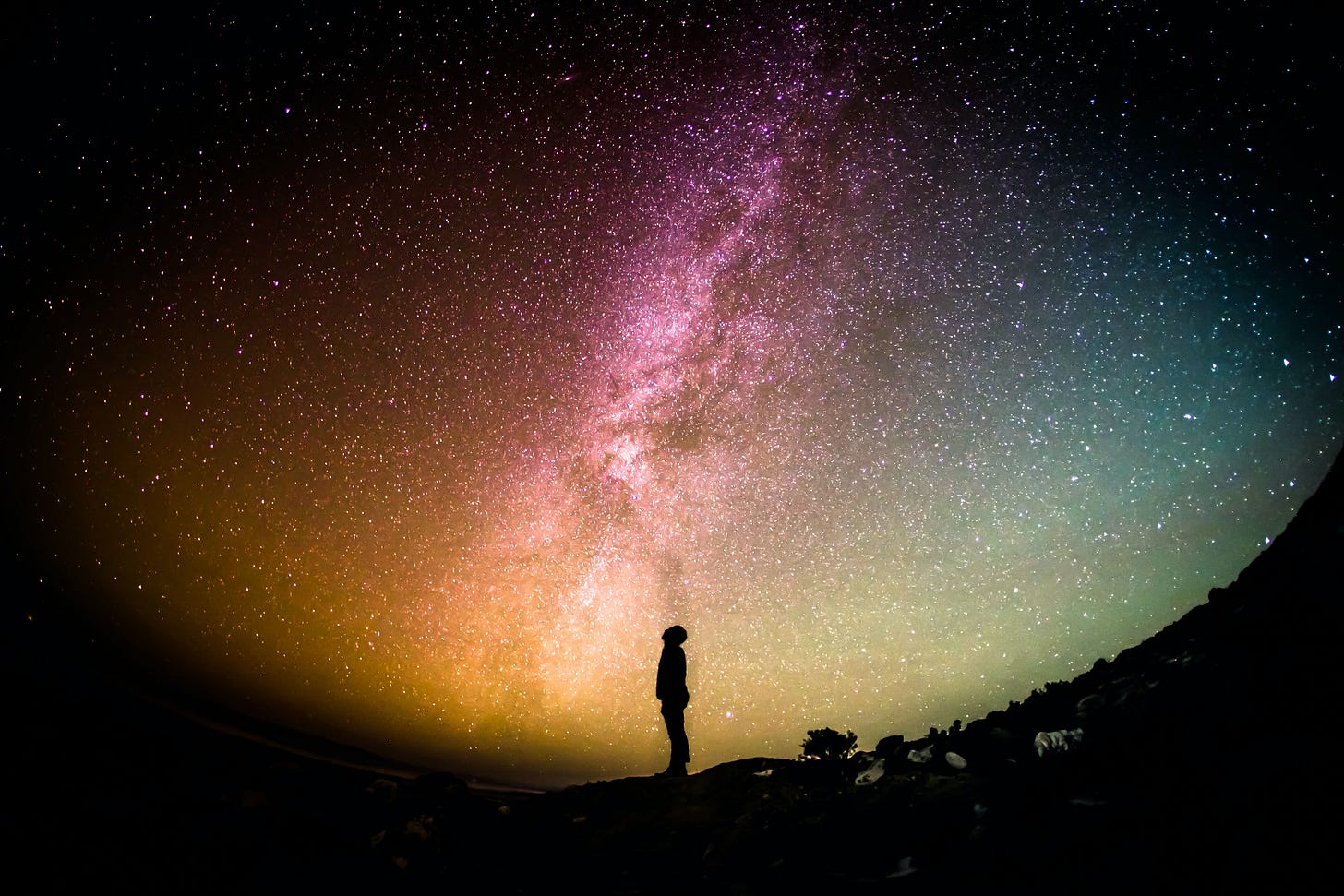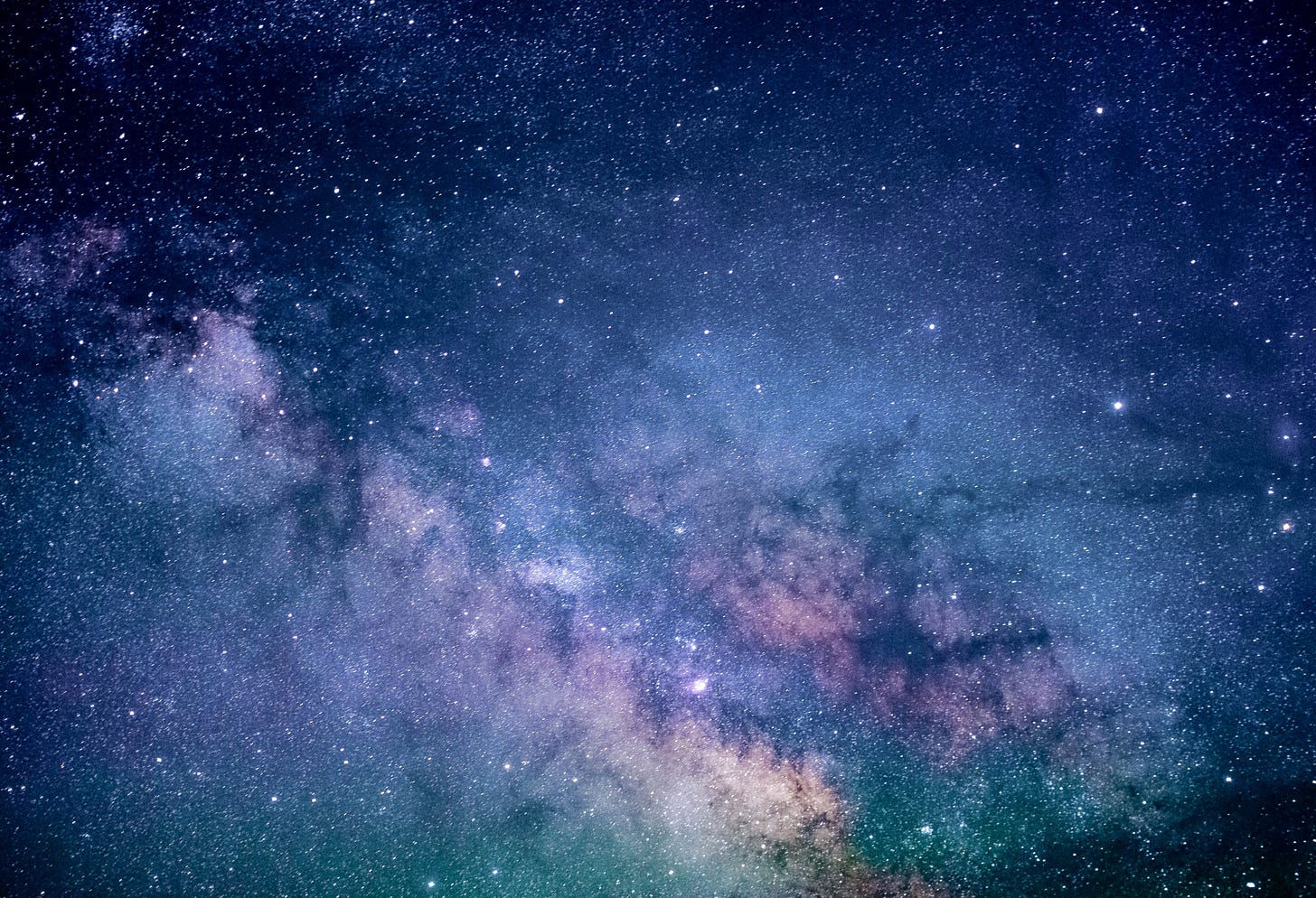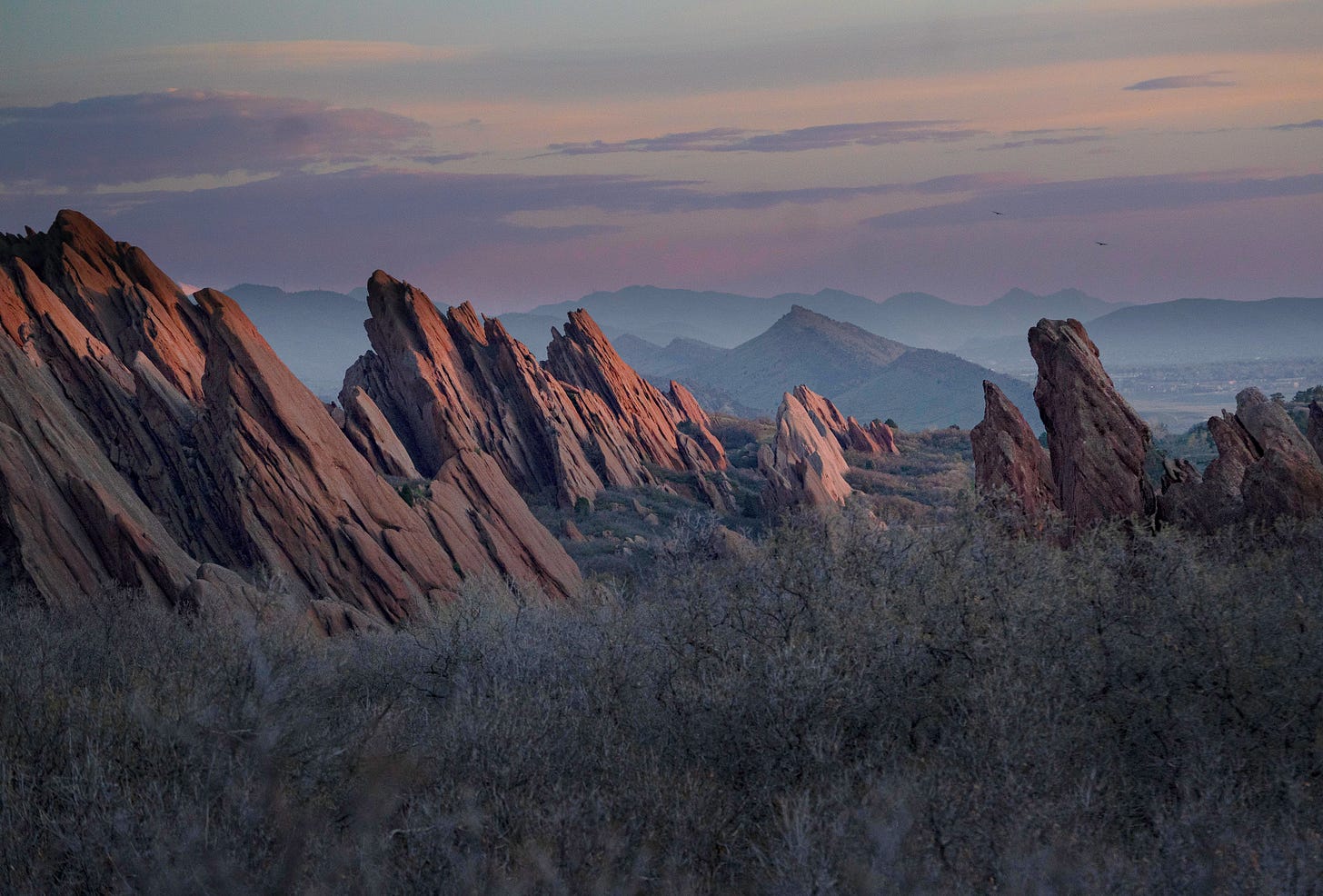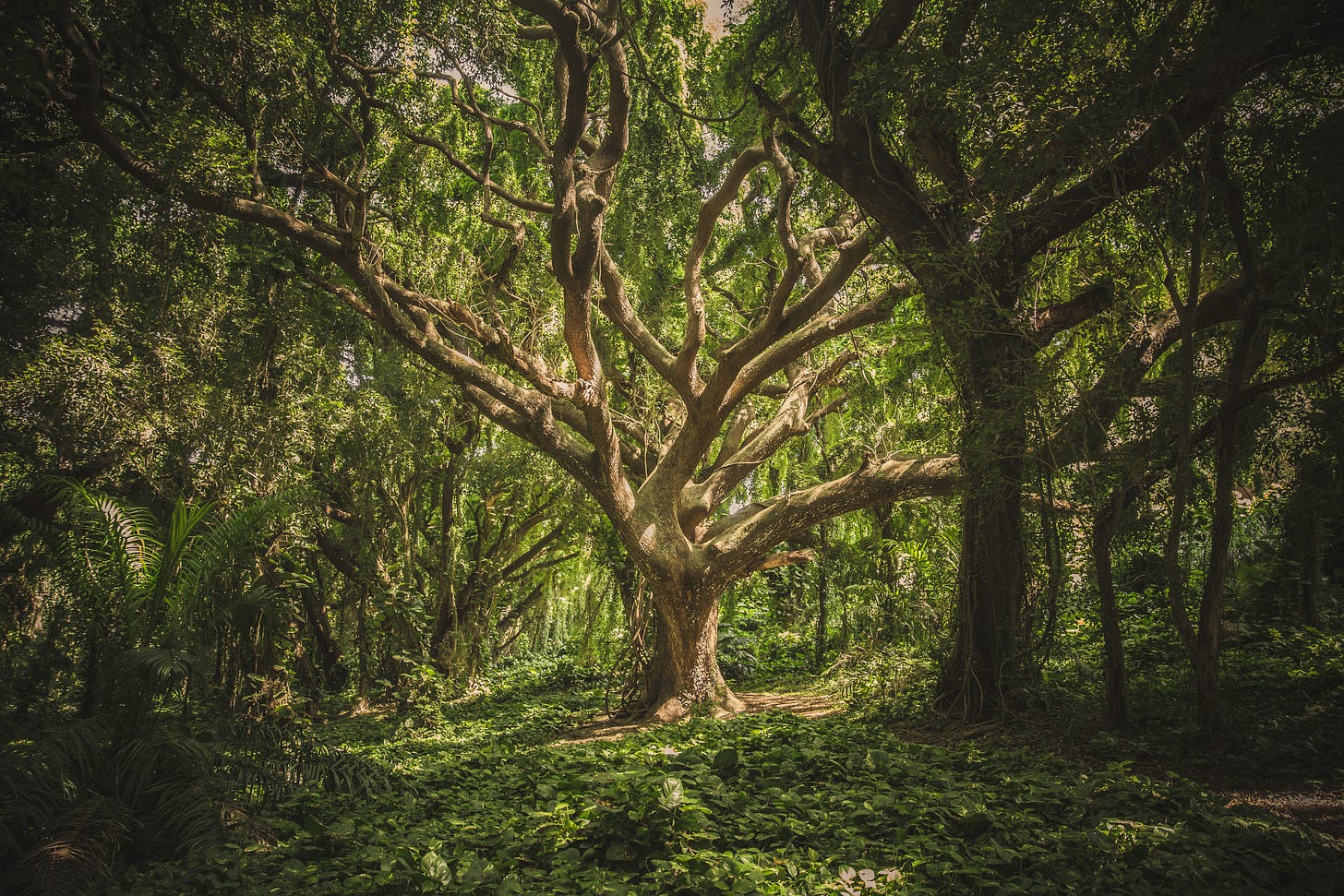We're never truly alone
On existence, societal expectations, relationships, humanity, love, and life
Life has been very busy and difficult for me lately. Usually, I write a lot during those times but I’ve been able to find the time or motivation to wax poetic about life. It’s been liberating to kind of just experience life and discomfort without feeling like I had to articulate some grandiose point of life in the immediate term. After a few months of not writing here, I’ve poured my thoughts and emotions into this essay. I’ve been struggling but what has restored my hope for life and the future is remembering how beautiful to be alive at all and how much I love humanity, Earth, and the universe. I hope you enjoy this essay, and I hope you share it with those in your life who may enjoy it. Thanks, as always, for your support of my writing. I am eternally thankful that people care about what I write.

I’ve been living alone for the first time in my life. For somebody who despises being in solitude, this has been a difficult couple of weeks. I’ve lived with family or friends for my entire life so to suddenly live alone with Duncan has forced me to spend more time alone than ever before. When I’m with others, there are parts of myself that I like. I like being supportive and nonjudgemental when my friends and family need advice. I like trying to make people feel comforted and I really like making others laugh or talk about life and the romantic parts that come with being human. When I’m alone, I wonder why I hate being by myself so much. Why can’t I strive to be to myself what I am to others? When I think about what I love about those I’ve enjoyed spending time with, I assume the characteristics that I like most about them translate to their solitary time; if they make me laugh or make me feel loved, surely they treat themselves the same way. I’ve long wanted to be somebody who loved myself enough to be able to love being alone wherever on earth or whenever with others. I’ve not experienced that. I don’t know that anybody ever feels that way. There’s a good chance that every one of us has felt the crushing weight of loneliness, perhaps more often than not.
Spending a lot of time alone during a turbulent, tough season of life inevitably leads to some difficult time in one’s own mind. I enjoy thinking about my own life and “life” in the romantic sense; what does it mean to live a good life? What do we owe to ourselves, to others? How do we want to spend the precious time that we exist in this universe? We can ponder these questions from an abstract perspective; we seek to explain the global concepts of life and existence through religion, through philosophy, even through art, music, and culture. We can also ponder these questions from an individual perspective. It seems that being able to understand the collective components of life and society would be more important than understanding life and existence from an individual perspective, but our perspectives on the two don’t always necessarily align. We may believe that humans, collectively, are responsible for one another’s well-being, but in practice we often see that people will only accept so much individual sacrifice for others’ well-being. We see this when people litter or when people refuse to wear masks or when people are okay with treating others rudely and terribly in the name of customer service. We excuse atrocities because confronting them would require us to recognize the depravities that humans are capable of. We applaud those that sacrifice their reputations or even their lives to confront the status quo only decades after their name has been whitewashed into oblivion to being “acceptable.” MLK, ever the hero, was despised during his life, and even to this day, his anticapitalist, antiracist, and anti-imperialist quotes are censored or whitewashed until his views become “acceptable” by even today’s standards.
When we’re alone, we are forced to confront ourselves. And when we confront ourselves, we can challenge the ways we’ve been misled or mistaken because of others’ negative intentions or behavior or because of the way we’re conditioned to believe the world exists because of societal expectations. We can also romanticize the ways in which our experiences with others restore our belief in the beauty of life, existence, humanity. We can remember that it is often others who remind us that we must remain steadfast in our hope for a better life and a better world.
Consider the so-called rise in people who identify as being members of the collective LGBT+ community (which is composed of many subcommunities). Consider the way we frame this concept: Gallup, a reputable news and polling organization, frames it as a “rise” and even breaks it down along generational lines by indicating 1 in 6 Zoomers identify as LGBT+. This framing seems to indicate it as the population is truly changing in favor of non-binary or “non-traditional” (traditional usually meaning regressive or reductive) gender identities and sexualities. Are Americans becoming more queer, or is queerness becoming more socially acceptable across more cross-sections of American society? Perhaps America is becoming more queer in the sense that people, especially younger people, are learning how to articulate their feelings because they have more resources, non-heteronormative and non-cisnormative representation in media, and furthermore, but I’d argue that nobody is necessarily changing in their queerness but rather the collective understanding across more populations than ever before are allowing people to be more open and honest about their complex feelings. Even discussing subjects like toxic masculinity and mental health aren’t quite the professional and reputational quagmires they once were, thus allowing men to be less concerned with being harshly judged. We have a long way to go, of course, but the needle is moving in the right direction. Changing narratives around queerness and masculinity are allowing us to confront the deeply-held regressive and harmful societal notions that have been integrated into America society through culture and political institutions. But these societal expectations have only begun to change because of those who have been willing to confront what they accurately believed to be harmful reductive concepts about human sexuality and gender identity. Those who were willing to unlearn how societal expectations are not intrinsic truths about life and existence but rather changing concepts that we humans are allowed to define and change were the ones who moved the needle, sometimes at great risk to themselves.
A human at any given moment is composed of two formative factors: Environment and genetics. We have found there are genetic proclivities for behavior but even genetic proclivities are intensified or mitigated by environmental factors. You’ve probably heard of “nature vs. nurture,” meaning that who we are is either due to genetic components by which we can’t control or by the environment in which we are raised, meaning that we are a by-product of how the people who raised us raised us. Like most things in life, this is not a binary but rather a spectrum; it only makes sense that we are the result of both. In some ways, it may be more genetics that plays into how stubborn we are, but in others, perhaps it was because a parent or loved one taught us to be empathetic at a young age. Most likely, genetics and environment affect every aspect of who we are in different ratios. Some would say that it’s frustrating to not have an easy answer; I don’t think it’s frustrating at all since this explanation is actually simpler. To believe that every person is entirely due to their genetics or environment would be a ridiculous (and honestly, tragic) simplification of what it means to be a human.
That we as humans are the result of trillions of microscopic atoms working together in concert to amount to a human being capable of thought and also that we are affected by every other human, who are also the result of millions of other microscopic atoms and other humans as well, is such a romantic concept that whenever I ponder it for more than a few minutes, it can reduce me to tears. We are mosaics of trillions of unalive, unthinking atoms and every human we’ve ever interacted with. As far we currently know, we are the only planet to ever harbor intelligent life. Even if we aren’t the first or only, we know that life is exceedingly rare. Even considering the unintelligent life on earth from fungi to bacteria to the somewhat intelligent life of animals, it’s hard to overstate just how unlikely it was that conditions would dovetail well enough together to bring rise to oceans and forests and life on a planet such as Earth. We don’t understand this because we were born with it; we understand this because humans have an unrelenting need to make sense of our place in the universe. It is beautiful that we care so much about why we exist that we have conceptualized an explanation for how we exist. To be a human is to be incapable of being truly alone. We can be alone in a moment in a physical sense, but even when we are alone, we are the result of people that we love, that we care about, that we admire, even that we resent, and we are also the result of trillions of atoms and billions of years of conditions and circumstances that have led us to this very moment.
In the same way that this is as beautiful of a realization as any, I feel an equal but opposite devastation that we have cultivated so many aspects of society to cause suffering to other humans, to other beings, to our planet because of a misplaced sense of hate or even a misplaced sense of love or out of fear or out of the uniquely human concept of profit. So much of the suffering on planet earth is avoidable. Poverty, hunger, homelessness, unclean water; all of these are human choices. There is no law of the universe that a species must have a certain percentage of a species suffering for the perpetuity of the entire species. Some people will abuse the theory of evolution and one of its core tenets being survival and reproduction being the operators of a species’ success to claim that humans are Darwinian and therefore not everybody can thrive. This is an outdated concept; in some ways, we’ve actually defeated evolution. We can artificially select and force bacteria or viruses to evolve into different species; we can do the same with animals and foodstuffs. We have cured diseases that have devastated generations before us. We will likely one day be able to extend life for previously unheard-of lengths. Resources on planet earth are plenty enough to provide for every living being. Greed and exploitation are what perpetuate continued suffering, at least in those respects. One day when we cure cancer, in case something changes soon, only some of the planet will see that cure. We’ve seen this with the COVID vaccines already.
When we believe we are alone in this existence, we can create a narrative that we have only ourselves to truly rely on. I really despise this notion. We are not alone in this existence and even though the present moment is the only time that exists in a physical sense, we are never really alone because we’ve never really ever been alone. We are composed of unthinking atoms, yet we are constantly thinking and perceiving the world and making new friends and memories and experiencing grief and heartbreak and ecstasy and joy and awe and wonder and beauty. We are inextricably linked to the earth because it’s the only home we’ve ever known, and while we dream about exploring space, we must not treat earth as a temporary place in our existence. We must not view planet earth as an unthinking being that has not provided for us and we certainly, absolutely should not believe it is a resource to be mined and abused until we find a “better” planet.
Lately when I’ve been feeling really lonely, I’ve made it a priority to get on the phone with somebody. Sometimes it’s somebody I talk to regularly but my goal has been to talk to people I’ve been friends with but have lost contact or just not spoken to very much in recent years. These conversations have been restorative for me. Nearly every single one will have me in tears in some way. I’ve noticed I’ve been crying more than ever recently. I’ve never been one to be afraid of crying, but these tears have been inspired by feeling the love that comes with connecting with people and hearing people share their passions, concerns, and everything in between. These conversations have reminded me that, whether or not people openly admit it to themselves or others, at the end of the day, we’re all just trying to figure shit out all the time. Nobody on earth has everything figured out and those that claim they do are either lying to themselves or to you. I consider it to be intelligent and mature to be unsure and confused about life and our decisions because I know that if you are unsure, then you realize how life is not a binary but a spectrum. There are decisions that we have to make that will make us sad, and yet, we know we have to make them.

During these conversations, I’ve noticed sometimes people just really desire to be feel validated in their emotions and experiences. What makes me sad is that a lot of these emotions are entirely valid and make sense to me as an individual but that people feel invalid for experiencing this emotion because it does not align with traditional societal expectations. There are people who still feel wrong for not aspiring to make millions of dollars because they’d rather explore the world and create art or help others, but they know there isn’t exactly a ton of money in those pursuits. I’ve also noticed that relationships — both romantic and friendly — weigh on people more than mostly anything else. We tend to think of relationships as a binary — either romantic or friendly, or either monogamously or not — when relationships, like most things in life, are a spectrum. Some people prefer monogamy, some don’t; both are valid as long as your preference isn’t hurting others by deceit or manipulation. But this is where societal expectations can influence our perspective more than we care to admit or acknowledge. As a society that has Christianity entrenched into its culture and political institutions, marriage and parenthood have become societal expectations. Most people in the US have learned about the nuclear family and marriage and how these are the American dream for their entire lives. Religion is also similar. Some people are raised in Christian households and see how acceptable it is to be anti-Semitic or Islamophobic or even just believe that they are supposed to convert other people to their religion. These people can become so indoctrinated that it isn’t until they meet somebody who believes something different that they realize that everybody, no matter their race, religion, sexuality, or gender identity, has humanity. Even when learning about others’ humanity, it can take years and years of unlearning and exposure and research for us to see through the haze of our upbringing and our experiences.
We as humans are mosaics of our genetics and everything we’ve ever experienced including the way we’ve learned what society believes to be the life we should strive for. To challenge the status quo because we have learned from others the beauty of life and existence is to be a human motivated to create a better world for everybody. To see the status quo and wonder if perhaps the status quo is not some intrinsic reality but that the status quo exists because of humans with vested interests, power structures, and political and social institutions is a step to reconciling our humanity and presence in the universe.
We are never alone in this existence. We are able to create a better world for ourselves and for others by asking ourselves why we believe what we believe. There is no intrinsic reality to the way society operates and we are the arbiters that can bring along the change we desire to see in our lives and the world.
I was raised Catholic. My parents never raised me to believe that others were going to hell for different beliefs but it was when I really considered the concept of hell that I became disillusioned with organized religion. I had been raised to believe that other humans were as human as me and to believe that a different religion confined them to eternal torment fundamentally challenged the belief that they were equally human. I hated the idea that others may believe I deserved eternal torment because I was Catholic; I hated the idea even more that I was supposed to live a good life while simultaneously occupying a society where I was supposed to believe that other humans that I loved may experience damnation. I chose to believe in their humanity instead of believing they deserved anything differently than me. Their act of good was equal to mine, whether they were inspired by Jesus Christ, Muhammad, or just an inherent belief in doing right by others.

Something I’ve been thinking about a lot lately is the complex emotions my parents must have experienced upon learning their daughter was diagnosed with CF and then when they learned I was as well. I recognize they must have experienced intense anger and sorrow upon learning both times. Maybe my diagnosis was easier since they understood CF a little bit more, or maybe it was harder because they understood CF a little bit more. I worry that my parents weren’t able to be fully honest with themselves about their emotions. I assume they likely felt that, as parents, their emotions had to be predicated on a love of their children and that loving their children meant not being pissed off about both of their children being diagnosed with a terrible fucking disease. I assume there were plenty of days and nights that they felt frustration and sadness that other parents had children without diseases. They probably cursed when their friends were living “normal” lives while they were driving us to appointments and wondering if we would see adulthood. I’d never fault my parents for these emotions. They’re perfectly valid. It makes me sad that they probably felt these emotions, not because they felt them but because they had to feel them because they loved us so much. What makes me sadder is I don’t think my parents had anybody in their lives who provided them a space to openly vent about these tragically complex emotions. I think about how I wish I could’ve been there to talk to them during these difficult times and let them know that it isn’t in spite of their love for us that they were pissed off that theirs and our lives ended up the way they did, but because of their love for one another, us, and life in general.
Nowadays, I’m less religious than I am spiritual. The billions of years, conditions, and circumstances that have led to my and your existence would be considered science fiction if they weren’t true. Spending a lot more time alone has helped me realize I am never truly alone. How could I ever feel alone or worthless when I consider the existence of life at all? Or when I think about the beauty of human relationships and creating memories with people?
How could I ever feel alone when I realize I am a mosaic of trillions of unthinking atoms and every person I have ever interacted with?
The beautiful truth is: We’re never truly alone.
tl





I love your writing. You echo many of my thoughts about humanity, and i appreciate your honesty. I wish more people were as introspective.
I am grate you are a part of my
mosaic, Tré. I love you dearly.